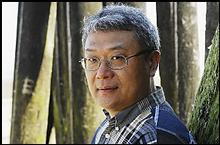It's hard not to read the story of Nan Wu, the protagonist
of Ha Jin's expansive new novel, A Free Life, as an
imagining of another life the author might have led.
Jin, whose luminous Waiting won the National Book
Award, was assigned by his Chinese college to study English,
a field he did not favor, but which eventually led to his
traveling to the United States for graduate school. Jin
remained here after the 1989 Tiananmen Square massacre made
it impossible for him to return in good conscience. He
earned his Ph.D. while balancing gigs as a night watchman
and a busboy and eventually chose to write in English, in
part because the sort of honest writing he wished to do
could not be published in China.
 Jin,
working painstakingly in a language that he'd learned
relatively late in life, published two volumes of poetry
before beginning to publish fiction - and the rest is
history.
In A Free Life, the fictional Nan Wu is assigned to
study political science in college, but while in America at
work on his Ph.D., he becomes disillusioned with the subject
following the events at Tiananmen Square. Wu decides to
forgo his studies and strike out on his own with his family,
leaving the sheltered world of academia.
Though his passion is for poetry, he is married and has a
young son, and knows he must become a businessman to
survive. He takes a job as a night watchman that allows him
to read and study the English dictionary, and at one point
he asks a Russian coworker with a shady side business for
advice. "In America there're only two ways to acquire
riches," the coworker advises. "First, use others' money;
second, use others' labor."
Wu is never able to follow this formula, having to earn
every dollar through his own efforts. Eventually, he takes a
job in a restaurant, learns to cook and moves his family to
the Atlanta area where they buy a small Chinese restaurant
and start taking a crack at their American dream.
Part of what makes Wu so compelling as a character, however,
is that his American dream has more dimensions than the
typical story of an immigrant saving and slaving until he
owns a home and can send his children to good schools. Wu
does plenty of backbreaking work at the restaurant, but he
is unwilling to abandon his artistic yearnings and pour all
his hopes into the life of his son, as fellow Chinese
immigrants urge.
Wu's tenacious if spotty pursuit of his development as a
poet echoes another great American novel of immigration,
Willa Cather's My Antonia, in which the title
character's Bohemian immigrant father puts aside his art -
fiddle playing - to make a go in America but ultimately
can't bear up under the struggle. It's clear the choice Wu
makes to continue with his poetry despite his difficulties
is a life-saver.
Another dimension to Wu's American dream is that he's an
inveterate romantic, still harboring a crush on his first
girlfriend, Beina, who jilted him before he met and married
his wife, Pingping. Wu doesn't feel the intense passion
toward Pingping that he had for Beina, and the couple's open
acknowledgement of this is a source of tension in the
relationship.
Pingping is devoted to her husband, a diligent mother,
hard-working, adaptable and sharp - the reader falls in love
with her far earlier in the book than Wu is able to. The
wayward nature of Wu's heart troubles him, and the fact that
his continuing crush on Beina causes him such distress, even
though he remains a faithful husband, is an insight to his
character. He values transparently honest living; for him
thoughts and words are the same as deeds.
These themes of the pursuit of the American dream and
longing for passionate rather than companionate love
underlie A Free Life, but on the surface the book
focuses on adjusting to life in this country. The striking
insights Ha Jin offers about life in America show what
America looks like to an outsider and how odd English idioms
can sound to a non-native speaker. At one point, Pingping
thinks playing "hooky" must have something to do with being
a hooker.
And when the Wus first buy a house, they can't "figure out
what the little red flag on the mailbox was supposed to do."
So they guess: "Now every morning before going to work, Nan
would raise the tiny flag as a way to greet the postman. . .
. Then one day Pingping found a slip of paper in the
mailbox, bearing these words: 'Don't let your kids play with
the flag! Keep it up only when you have mail to go.' "
The American way of using credit to acquire material goods
is foreign to the Wus. They live in great anxiety during the
years when they have a mortgage on their home, even though
Wu insists to Pingping, "We must shed our Chinese mind- set
and learn to accept insecurity as a living condition."
Wu can't adhere to his own advice and puts aside his poetry
for a time to concentrate on making money. But by the end of
the book, he's returned to his art, and the novel closes
with a selection of poetry he's written about the events of
his life, pieces that any reader who has come to root for
him will enjoy.
Wu's choice to write in English, like Jin's, was a
deliberate one. Most Americans live their lives in the same
language they were born into, feeling no more than a mellow
love for it. In A Free Life, another excellent book
that, like Waiting, involves the thwarted pursuit of
passion, Jin has proved, through crystalline prose studded
with unusual words, that he has a rare ardor for his adopted
language.
|





